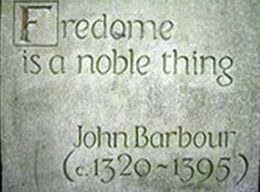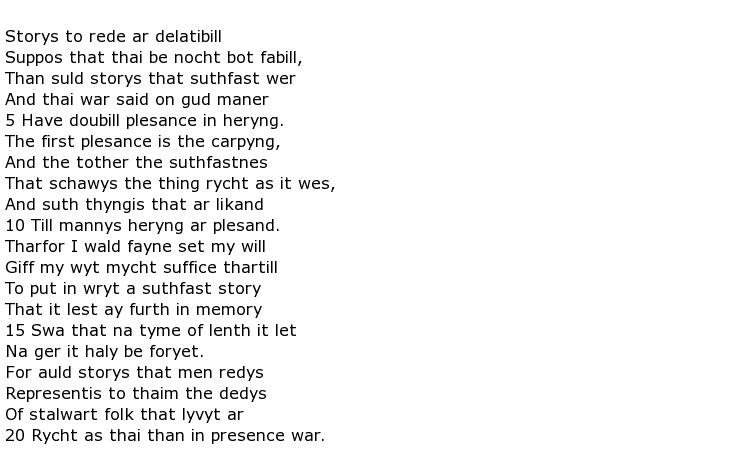 John Barbour was a 14th century Scottish poet, church minister and royal courtier who, it is believed, was the first to write in a Germanic version of the Middle English language known as Scots. This variety was popular in the Lowlands of Scotland while Gaelic was spoken in the Highlands and Islands regions, and still is to some degree. His most famous piece of work was an epic poem, commissioned in 1371, about Robert the Bruce, called The Brus. It survives to this day and is, undoubtedly, his masterpiece. As a church man Barbour was appointed Archdeacon of Aberdeen’s cathedral Kirk of St Machar in 1356.
John Barbour was a 14th century Scottish poet, church minister and royal courtier who, it is believed, was the first to write in a Germanic version of the Middle English language known as Scots. This variety was popular in the Lowlands of Scotland while Gaelic was spoken in the Highlands and Islands regions, and still is to some degree. His most famous piece of work was an epic poem, commissioned in 1371, about Robert the Bruce, called The Brus. It survives to this day and is, undoubtedly, his masterpiece. As a church man Barbour was appointed Archdeacon of Aberdeen’s cathedral Kirk of St Machar in 1356.
It is believed that he was born around the year 1320, though this cannot be confirmed. Neither can his place of birth but it may have been somewhere in the far north of Scotland. His family name is sometimes spelled Barbier or Barbere, indicating the clear French influences of the time. He almost certainly studied in both England and France at various times. Indeed, in 1357, he was “granted safe passage” by King Edward III to study at Oxford, this protection being necessary because of the political upheavals of the time. This was highlighted by the fact that the Scottish King, David II, was imprisoned in England and Barbour was appointed to negotiate a ransom for his release.
He continued to enjoy Scottish royal favour for the rest of his life, being given the opportunity to travel to France for educational purposes on more than one occasion. He would certainly have been considered an influential royal courtier and was eventually granted a life pension of 20 shillings by the king. It was a descendent of the famous Robert the Bruce who encouraged Barbour to pen the epic, twenty-book account of his life and the many Wars of Independence fought between the Scots and English. The new king, Robert II, paid him “ten pounds Scots” for his work.
Here is a short extract from The Brus, the opening lines of Book I. Although written in that peculiar, ancient dialect it is still possible to understand the meaning of most of it, hence its popularity with modern students of Scottish literature:

Further down in this first book, at lines 225-228 are Barbour’s most-often quoted lines which emphasise the underlying sentiment of the whole project that, after all, “Freedom is a noble thing”. Here are those lines:

As well as the king, another major character in this piece was Sir James Douglas, one of the feudal lords who had a great influence on the Wars of Scottish Independence. It was certainly a patriotic piece, with both Bruce and Douglas depicted as prime examples of Scottish chivalry. But Barbour also set out to produce something historically accurate so that future generations would know what happened. It covers such momentous occasions as the Battle of Bannockburn, King Robert’s great victory over the English at Stirling Castle in 1314.
There was romance in these tales of great valour and human sacrifice but Barbour used a vigorous style of delivery to ensure that the reader would be carried along at a great pace, as befitting the subject matter. This, and other writing, took up a great deal of his time but he still managed to hold down a number of posts in the royal household, particular in the exchequer and audit departments.
John Barbour, often called the “Father of Scots poetry”, died on the 13th March 1395, probably in Aberdeen. His age would have been around 75 years.

